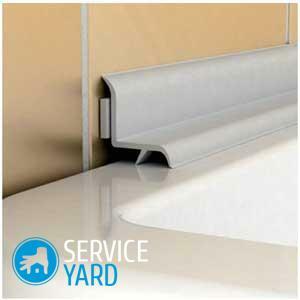
- Problems with the water trap
- Air flow violation
- Condensation or leaks
- Pipe coating
- Wrong choice of pipes for repair
- Washer
- Depressurization of pipe connections in the bathroom and toilet
If your bathroom has an unpleasant smell, do not try to cope with itwith the help of air fresheners. This will not help - gradually the fragrance will creep over your apartment. In addition to the fact that such an ambree is unpleasant in itself, it is also harmful to health. Therefore, immediately it is necessary to identify the cause of this odor and take appropriate measures. Consider in this article, if there was a smell of sewer in the bathroom - what reasons and how to eliminate?
to the contents ↑Watertight problems
The bathtub is connected to a common sewer by a flexible pipe, which is called a siphon or water seal. Siphon always has a curved shape and a drop, so that dirty water does not pour back.
Important! In the siphon, a water seal is also formed, which prevents the smell coming from the sewer. If this obstacle disappears for any reason, there is a smell of sewerage in the bathroom.
Why is there a problem with the siphon? There are several reasons for this:
- Over time, the corrugated part of the siphon can lose its original rigidity, elasticity, stretch, sag. Water ceases to accumulate, thus, the water shutter, which restrains the amber from the sewage system, disappears.
- Another reason may be incorrect installation of the water seal. They will come to the plumbing plumbing, install a siphon, for example, in an inverted form or strongly stretch the corrugated pipe.
- With prolonged downtime of plumbing, stagnant water inside the siphon begins to evaporate, creating an unpleasant odor.
- With prolonged use, dirt, hair, grease settles on the walls of the siphon. All this leads to the appearance of an unpleasant odor from the plum bath.
Important! These reasons can not be easily eliminated:
- It is necessary to disassemble the siphon, clean it of dirt, bring the corrugated part to its normal position, check whether the parts of the hydraulic seal are tightly fitted.
- If the siphon has become unusable, it must be replaced.
- If you have not used the bathroom for a long time, you need to drain the water from the siphon.
Disturbance of air circulation
In a bathroom that is permanently wet, good ventilation is very important. It not only removes odors, but also dries air, reducing the amount of condensate. To determine how the hood works, it's easy - you need to bring a piece of paper to it:
- A well-working hood pulls the sheet.
- If the paper falls to the floor, then - the air duct is clogged. It should be cleaned and the air circulation restored.
Important! If it seems to you that the smell does not come from you, but from neighbors, then it is worthwhile to call the masters from the housing office. Maybe the general ventilation shaft is clogged. Sometimes birds or mice get there.
to the contents ↑Condensate or leaks
Do not exclude the possibility of leaks and condensation. It is very difficult to determine the location of the condensate in a small room, such as a bathtub, where there are many types of sanitary ware:
- Check if the water is in the laundry basket, on the shelves with cosmetics. The water that gets there can rot and create an unpleasant odor.
- Leaks can be in hard-to-reach places: behind the washing machine, under the sink.
 If you do not pay attention, the water will eventually destroy the floor covering and get to the neighbors. And without repair will not do.
If you do not pay attention, the water will eventually destroy the floor covering and get to the neighbors. And without repair will not do.
Important! When repairing the bathroom, it is not necessary to install tees and pipe connections in hard-to-reach places. It is best to supply one pipe for each plumbing fixture. Less connections - fewer leaks.
If the condensate still accumulates in a hard-to-reach place, then there is a simple way out - to get somehow to this place and warm its walls and pipes so that the temperature remains more or less the same.
to the table of contents ↑Pipe coating
One possible reason for the smell of sewage in the bathroom is the plaque on the pipes, which reduces their internal diameter and disrupts the water circulation. This problem most often occurs if the apartment has cast-iron pipes. In this case, it is necessary to clean the sewer. To do this, you can use a variety of ways and means - from a plumbing cable and a plunger, to modern chemical preparations from blockages and folk remedies such as soda, vinegar.
to contents ↑Wrong choice of pipes for repairing
If pipes with a smaller diameter than normal are installed in the repair, or incorrect installation is done, this can also lead to an unpleasant smell. Here, apart from changing the plumbing, nothing will save you.
to the contents ↑Washing machine
Sometimes a washing machine can cause such trouble. This can occur if the drain hose insert is inserted after the hydraulic seal. Then the fragrance will seep through the drum of the washing machine.
to content ↑Depressurization of tubing connections in the bathroom and toilet
One of the common causes of the stench in the bathroom and toilet can be partial depressurization of the pipes. How in this case to remove the smell from the sewer in the bathroom and toilet?
- It is necessary to coat the joints with a sealant or silicone.
- Sometimes it is enough to replace the rubber sealing rings in the sockets of the sewage system.
Important! All cracks in the siphon and pipes should be properly sealed with a sealing tape and processed with silicone.
If the cracks on the pipes and siphon are cracks, all these measures are temporary and later you will have to think about buying new pipes.
To avoid such problems in the future, you must regularly clean the pipes, monitor the condition of the ventilation system and keep the bathroom clean. Then the smell of sewerage in the bathroom you will not bother - you can safely enjoy the water, perform washing and cosmetic procedures.



